Leadership and Management: Theories, Programs, and Development
VerifiedAdded on 2023/01/12
|14
|4839
|64
Report
AI Summary
This report provides a comprehensive overview of leadership and management, emphasizing their importance in business success. It defines leadership as influencing behavior and management as administering and controlling company affairs. The report explores various leadership theories, including behavioral and transformational leadership, and highlights the significance of leader behavior in employee performance. It also examines the NHS Leadership Academy and its programs designed to develop leaders within the National Health Service. The report discusses leadership characteristics, the differences between leadership and management, and the similarities in their roles within an organization. It further analyzes the Ohio State University and University of Michigan studies, which contributed to the understanding of leadership behavior. Finally, the report explains the four key factors of transformational leadership, including inspirational motivation, intellectual stimulation, idealized influence, and individualized consideration.

Understanding the
concepts of leadership
and management
concepts of leadership
and management
Paraphrase This Document
Need a fresh take? Get an instant paraphrase of this document with our AI Paraphraser

INTRODUCTION....................................................................................................................................4
MAIN BODY...........................................................................................................................................4
Leadership and management theories..................................................................................................4
Evaluate the leadership development programme...............................................................................9
CONCLUSION......................................................................................................................................12
REFERENCES.......................................................................................................................................14
MAIN BODY...........................................................................................................................................4
Leadership and management theories..................................................................................................4
Evaluate the leadership development programme...............................................................................9
CONCLUSION......................................................................................................................................12
REFERENCES.......................................................................................................................................14
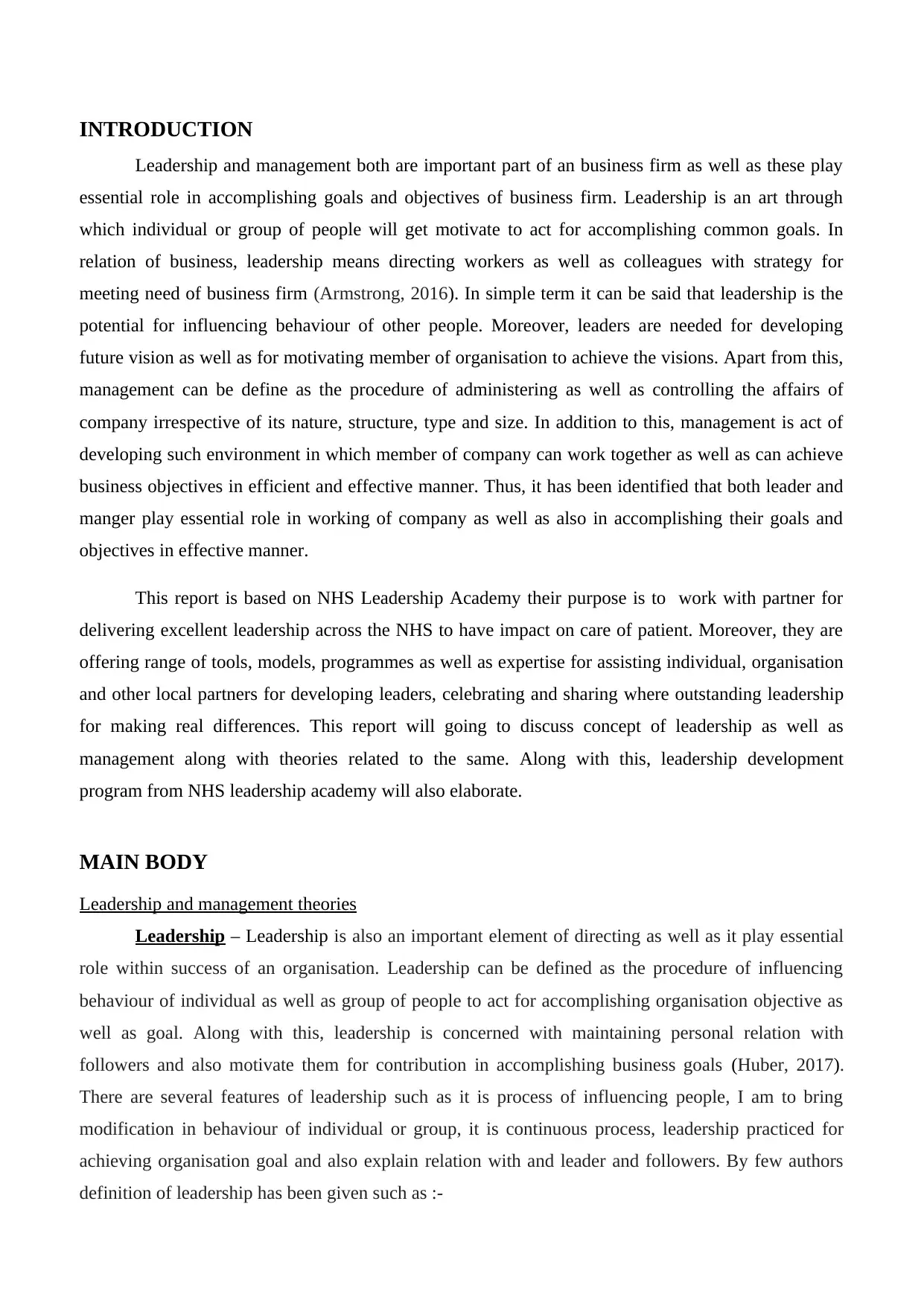
INTRODUCTION
Leadership and management both are important part of an business firm as well as these play
essential role in accomplishing goals and objectives of business firm. Leadership is an art through
which individual or group of people will get motivate to act for accomplishing common goals. In
relation of business, leadership means directing workers as well as colleagues with strategy for
meeting need of business firm (Armstrong, 2016). In simple term it can be said that leadership is the
potential for influencing behaviour of other people. Moreover, leaders are needed for developing
future vision as well as for motivating member of organisation to achieve the visions. Apart from this,
management can be define as the procedure of administering as well as controlling the affairs of
company irrespective of its nature, structure, type and size. In addition to this, management is act of
developing such environment in which member of company can work together as well as can achieve
business objectives in efficient and effective manner. Thus, it has been identified that both leader and
manger play essential role in working of company as well as also in accomplishing their goals and
objectives in effective manner.
This report is based on NHS Leadership Academy their purpose is to work with partner for
delivering excellent leadership across the NHS to have impact on care of patient. Moreover, they are
offering range of tools, models, programmes as well as expertise for assisting individual, organisation
and other local partners for developing leaders, celebrating and sharing where outstanding leadership
for making real differences. This report will going to discuss concept of leadership as well as
management along with theories related to the same. Along with this, leadership development
program from NHS leadership academy will also elaborate.
MAIN BODY
Leadership and management theories
Leadership – Leadership is also an important element of directing as well as it play essential
role within success of an organisation. Leadership can be defined as the procedure of influencing
behaviour of individual as well as group of people to act for accomplishing organisation objective as
well as goal. Along with this, leadership is concerned with maintaining personal relation with
followers and also motivate them for contribution in accomplishing business goals (Huber, 2017).
There are several features of leadership such as it is process of influencing people, I am to bring
modification in behaviour of individual or group, it is continuous process, leadership practiced for
achieving organisation goal and also explain relation with and leader and followers. By few authors
definition of leadership has been given such as :-
Leadership and management both are important part of an business firm as well as these play
essential role in accomplishing goals and objectives of business firm. Leadership is an art through
which individual or group of people will get motivate to act for accomplishing common goals. In
relation of business, leadership means directing workers as well as colleagues with strategy for
meeting need of business firm (Armstrong, 2016). In simple term it can be said that leadership is the
potential for influencing behaviour of other people. Moreover, leaders are needed for developing
future vision as well as for motivating member of organisation to achieve the visions. Apart from this,
management can be define as the procedure of administering as well as controlling the affairs of
company irrespective of its nature, structure, type and size. In addition to this, management is act of
developing such environment in which member of company can work together as well as can achieve
business objectives in efficient and effective manner. Thus, it has been identified that both leader and
manger play essential role in working of company as well as also in accomplishing their goals and
objectives in effective manner.
This report is based on NHS Leadership Academy their purpose is to work with partner for
delivering excellent leadership across the NHS to have impact on care of patient. Moreover, they are
offering range of tools, models, programmes as well as expertise for assisting individual, organisation
and other local partners for developing leaders, celebrating and sharing where outstanding leadership
for making real differences. This report will going to discuss concept of leadership as well as
management along with theories related to the same. Along with this, leadership development
program from NHS leadership academy will also elaborate.
MAIN BODY
Leadership and management theories
Leadership – Leadership is also an important element of directing as well as it play essential
role within success of an organisation. Leadership can be defined as the procedure of influencing
behaviour of individual as well as group of people to act for accomplishing organisation objective as
well as goal. Along with this, leadership is concerned with maintaining personal relation with
followers and also motivate them for contribution in accomplishing business goals (Huber, 2017).
There are several features of leadership such as it is process of influencing people, I am to bring
modification in behaviour of individual or group, it is continuous process, leadership practiced for
achieving organisation goal and also explain relation with and leader and followers. By few authors
definition of leadership has been given such as :-
⊘ This is a preview!⊘
Do you want full access?
Subscribe today to unlock all pages.

Trusted by 1+ million students worldwide
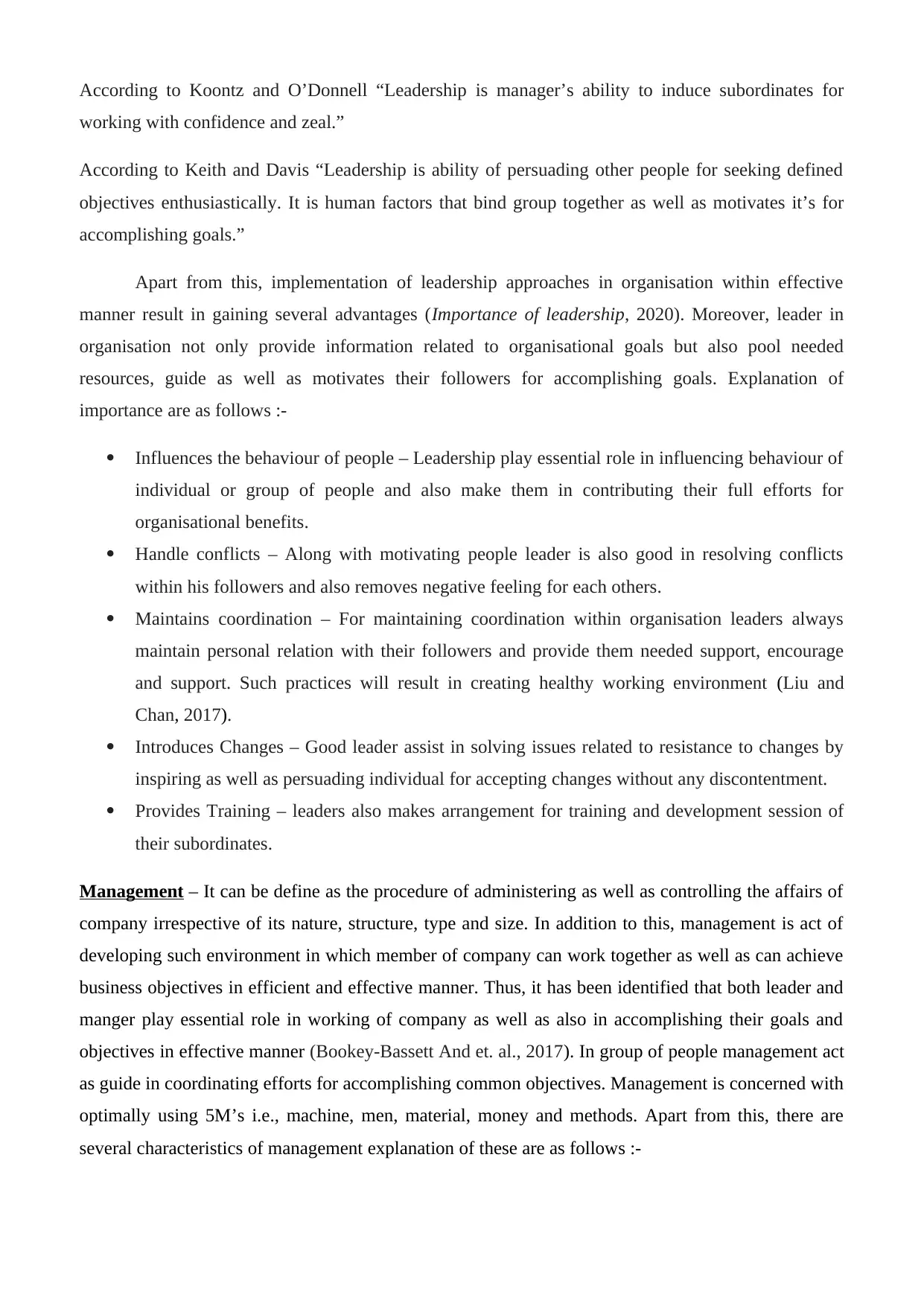
According to Koontz and O’Donnell “Leadership is manager’s ability to induce subordinates for
working with confidence and zeal.”
According to Keith and Davis “Leadership is ability of persuading other people for seeking defined
objectives enthusiastically. It is human factors that bind group together as well as motivates it’s for
accomplishing goals.”
Apart from this, implementation of leadership approaches in organisation within effective
manner result in gaining several advantages (Importance of leadership, 2020). Moreover, leader in
organisation not only provide information related to organisational goals but also pool needed
resources, guide as well as motivates their followers for accomplishing goals. Explanation of
importance are as follows :-
Influences the behaviour of people – Leadership play essential role in influencing behaviour of
individual or group of people and also make them in contributing their full efforts for
organisational benefits.
Handle conflicts – Along with motivating people leader is also good in resolving conflicts
within his followers and also removes negative feeling for each others.
Maintains coordination – For maintaining coordination within organisation leaders always
maintain personal relation with their followers and provide them needed support, encourage
and support. Such practices will result in creating healthy working environment (Liu and
Chan, 2017).
Introduces Changes – Good leader assist in solving issues related to resistance to changes by
inspiring as well as persuading individual for accepting changes without any discontentment.
Provides Training – leaders also makes arrangement for training and development session of
their subordinates.
Management – It can be define as the procedure of administering as well as controlling the affairs of
company irrespective of its nature, structure, type and size. In addition to this, management is act of
developing such environment in which member of company can work together as well as can achieve
business objectives in efficient and effective manner. Thus, it has been identified that both leader and
manger play essential role in working of company as well as also in accomplishing their goals and
objectives in effective manner (Bookey‐Bassett And et. al., 2017). In group of people management act
as guide in coordinating efforts for accomplishing common objectives. Management is concerned with
optimally using 5M’s i.e., machine, men, material, money and methods. Apart from this, there are
several characteristics of management explanation of these are as follows :-
working with confidence and zeal.”
According to Keith and Davis “Leadership is ability of persuading other people for seeking defined
objectives enthusiastically. It is human factors that bind group together as well as motivates it’s for
accomplishing goals.”
Apart from this, implementation of leadership approaches in organisation within effective
manner result in gaining several advantages (Importance of leadership, 2020). Moreover, leader in
organisation not only provide information related to organisational goals but also pool needed
resources, guide as well as motivates their followers for accomplishing goals. Explanation of
importance are as follows :-
Influences the behaviour of people – Leadership play essential role in influencing behaviour of
individual or group of people and also make them in contributing their full efforts for
organisational benefits.
Handle conflicts – Along with motivating people leader is also good in resolving conflicts
within his followers and also removes negative feeling for each others.
Maintains coordination – For maintaining coordination within organisation leaders always
maintain personal relation with their followers and provide them needed support, encourage
and support. Such practices will result in creating healthy working environment (Liu and
Chan, 2017).
Introduces Changes – Good leader assist in solving issues related to resistance to changes by
inspiring as well as persuading individual for accepting changes without any discontentment.
Provides Training – leaders also makes arrangement for training and development session of
their subordinates.
Management – It can be define as the procedure of administering as well as controlling the affairs of
company irrespective of its nature, structure, type and size. In addition to this, management is act of
developing such environment in which member of company can work together as well as can achieve
business objectives in efficient and effective manner. Thus, it has been identified that both leader and
manger play essential role in working of company as well as also in accomplishing their goals and
objectives in effective manner (Bookey‐Bassett And et. al., 2017). In group of people management act
as guide in coordinating efforts for accomplishing common objectives. Management is concerned with
optimally using 5M’s i.e., machine, men, material, money and methods. Apart from this, there are
several characteristics of management explanation of these are as follows :-
Paraphrase This Document
Need a fresh take? Get an instant paraphrase of this document with our AI Paraphraser
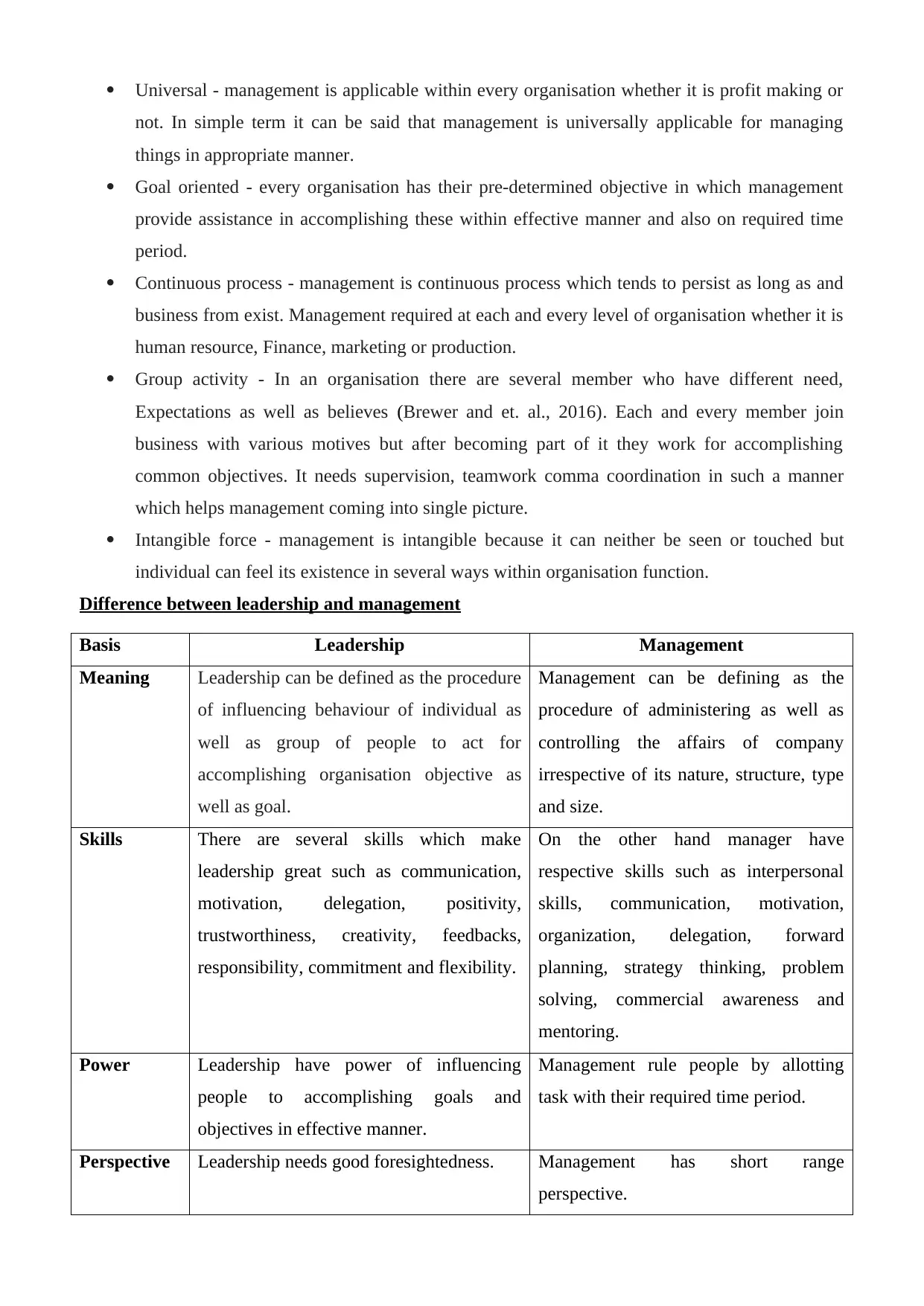
Universal - management is applicable within every organisation whether it is profit making or
not. In simple term it can be said that management is universally applicable for managing
things in appropriate manner.
Goal oriented - every organisation has their pre-determined objective in which management
provide assistance in accomplishing these within effective manner and also on required time
period.
Continuous process - management is continuous process which tends to persist as long as and
business from exist. Management required at each and every level of organisation whether it is
human resource, Finance, marketing or production.
Group activity - In an organisation there are several member who have different need,
Expectations as well as believes (Brewer and et. al., 2016). Each and every member join
business with various motives but after becoming part of it they work for accomplishing
common objectives. It needs supervision, teamwork comma coordination in such a manner
which helps management coming into single picture.
Intangible force - management is intangible because it can neither be seen or touched but
individual can feel its existence in several ways within organisation function.
Difference between leadership and management
Basis Leadership Management
Meaning Leadership can be defined as the procedure
of influencing behaviour of individual as
well as group of people to act for
accomplishing organisation objective as
well as goal.
Management can be defining as the
procedure of administering as well as
controlling the affairs of company
irrespective of its nature, structure, type
and size.
Skills There are several skills which make
leadership great such as communication,
motivation, delegation, positivity,
trustworthiness, creativity, feedbacks,
responsibility, commitment and flexibility.
On the other hand manager have
respective skills such as interpersonal
skills, communication, motivation,
organization, delegation, forward
planning, strategy thinking, problem
solving, commercial awareness and
mentoring.
Power Leadership have power of influencing
people to accomplishing goals and
objectives in effective manner.
Management rule people by allotting
task with their required time period.
Perspective Leadership needs good foresightedness. Management has short range
perspective.
not. In simple term it can be said that management is universally applicable for managing
things in appropriate manner.
Goal oriented - every organisation has their pre-determined objective in which management
provide assistance in accomplishing these within effective manner and also on required time
period.
Continuous process - management is continuous process which tends to persist as long as and
business from exist. Management required at each and every level of organisation whether it is
human resource, Finance, marketing or production.
Group activity - In an organisation there are several member who have different need,
Expectations as well as believes (Brewer and et. al., 2016). Each and every member join
business with various motives but after becoming part of it they work for accomplishing
common objectives. It needs supervision, teamwork comma coordination in such a manner
which helps management coming into single picture.
Intangible force - management is intangible because it can neither be seen or touched but
individual can feel its existence in several ways within organisation function.
Difference between leadership and management
Basis Leadership Management
Meaning Leadership can be defined as the procedure
of influencing behaviour of individual as
well as group of people to act for
accomplishing organisation objective as
well as goal.
Management can be defining as the
procedure of administering as well as
controlling the affairs of company
irrespective of its nature, structure, type
and size.
Skills There are several skills which make
leadership great such as communication,
motivation, delegation, positivity,
trustworthiness, creativity, feedbacks,
responsibility, commitment and flexibility.
On the other hand manager have
respective skills such as interpersonal
skills, communication, motivation,
organization, delegation, forward
planning, strategy thinking, problem
solving, commercial awareness and
mentoring.
Power Leadership have power of influencing
people to accomplishing goals and
objectives in effective manner.
Management rule people by allotting
task with their required time period.
Perspective Leadership needs good foresightedness. Management has short range
perspective.
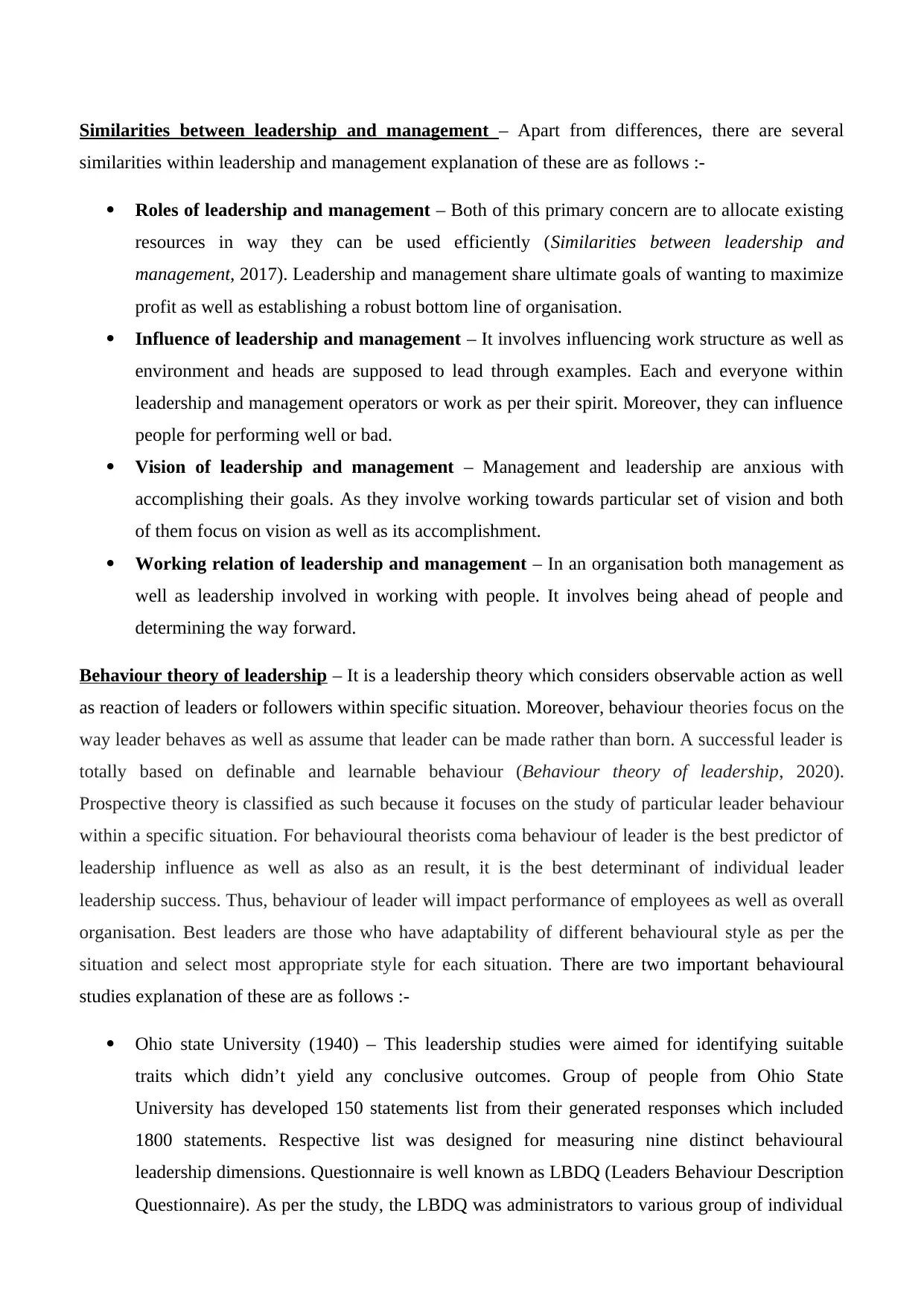
Similarities between leadership and management – Apart from differences, there are several
similarities within leadership and management explanation of these are as follows :-
Roles of leadership and management – Both of this primary concern are to allocate existing
resources in way they can be used efficiently (Similarities between leadership and
management, 2017). Leadership and management share ultimate goals of wanting to maximize
profit as well as establishing a robust bottom line of organisation.
Influence of leadership and management – It involves influencing work structure as well as
environment and heads are supposed to lead through examples. Each and everyone within
leadership and management operators or work as per their spirit. Moreover, they can influence
people for performing well or bad.
Vision of leadership and management – Management and leadership are anxious with
accomplishing their goals. As they involve working towards particular set of vision and both
of them focus on vision as well as its accomplishment.
Working relation of leadership and management – In an organisation both management as
well as leadership involved in working with people. It involves being ahead of people and
determining the way forward.
Behaviour theory of leadership – It is a leadership theory which considers observable action as well
as reaction of leaders or followers within specific situation. Moreover, behaviour theories focus on the
way leader behaves as well as assume that leader can be made rather than born. A successful leader is
totally based on definable and learnable behaviour (Behaviour theory of leadership, 2020).
Prospective theory is classified as such because it focuses on the study of particular leader behaviour
within a specific situation. For behavioural theorists coma behaviour of leader is the best predictor of
leadership influence as well as also as an result, it is the best determinant of individual leader
leadership success. Thus, behaviour of leader will impact performance of employees as well as overall
organisation. Best leaders are those who have adaptability of different behavioural style as per the
situation and select most appropriate style for each situation. There are two important behavioural
studies explanation of these are as follows :-
Ohio state University (1940) – This leadership studies were aimed for identifying suitable
traits which didn’t yield any conclusive outcomes. Group of people from Ohio State
University has developed 150 statements list from their generated responses which included
1800 statements. Respective list was designed for measuring nine distinct behavioural
leadership dimensions. Questionnaire is well known as LBDQ (Leaders Behaviour Description
Questionnaire). As per the study, the LBDQ was administrators to various group of individual
similarities within leadership and management explanation of these are as follows :-
Roles of leadership and management – Both of this primary concern are to allocate existing
resources in way they can be used efficiently (Similarities between leadership and
management, 2017). Leadership and management share ultimate goals of wanting to maximize
profit as well as establishing a robust bottom line of organisation.
Influence of leadership and management – It involves influencing work structure as well as
environment and heads are supposed to lead through examples. Each and everyone within
leadership and management operators or work as per their spirit. Moreover, they can influence
people for performing well or bad.
Vision of leadership and management – Management and leadership are anxious with
accomplishing their goals. As they involve working towards particular set of vision and both
of them focus on vision as well as its accomplishment.
Working relation of leadership and management – In an organisation both management as
well as leadership involved in working with people. It involves being ahead of people and
determining the way forward.
Behaviour theory of leadership – It is a leadership theory which considers observable action as well
as reaction of leaders or followers within specific situation. Moreover, behaviour theories focus on the
way leader behaves as well as assume that leader can be made rather than born. A successful leader is
totally based on definable and learnable behaviour (Behaviour theory of leadership, 2020).
Prospective theory is classified as such because it focuses on the study of particular leader behaviour
within a specific situation. For behavioural theorists coma behaviour of leader is the best predictor of
leadership influence as well as also as an result, it is the best determinant of individual leader
leadership success. Thus, behaviour of leader will impact performance of employees as well as overall
organisation. Best leaders are those who have adaptability of different behavioural style as per the
situation and select most appropriate style for each situation. There are two important behavioural
studies explanation of these are as follows :-
Ohio state University (1940) – This leadership studies were aimed for identifying suitable
traits which didn’t yield any conclusive outcomes. Group of people from Ohio State
University has developed 150 statements list from their generated responses which included
1800 statements. Respective list was designed for measuring nine distinct behavioural
leadership dimensions. Questionnaire is well known as LBDQ (Leaders Behaviour Description
Questionnaire). As per the study, the LBDQ was administrators to various group of individual
⊘ This is a preview!⊘
Do you want full access?
Subscribe today to unlock all pages.

Trusted by 1+ million students worldwide
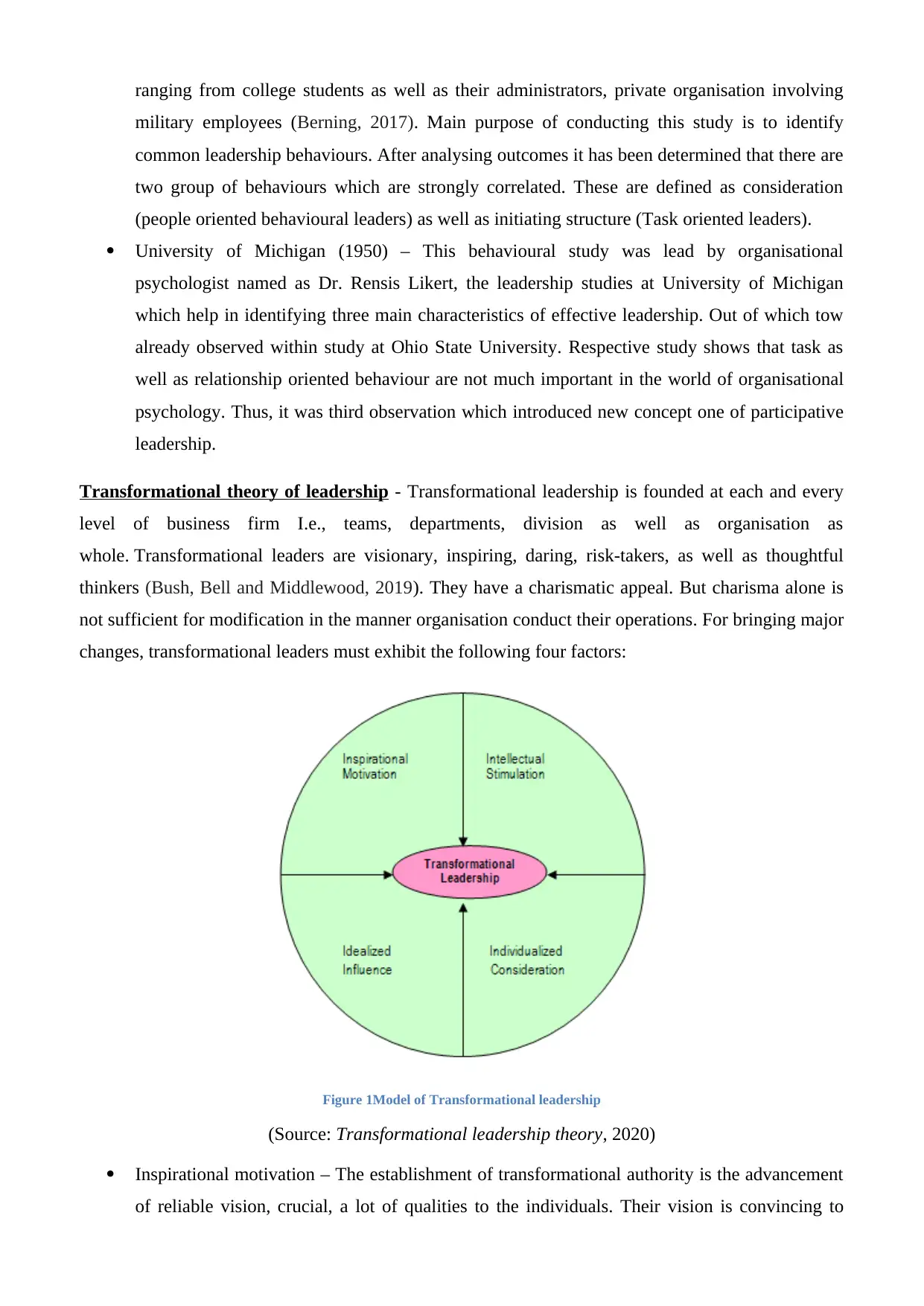
ranging from college students as well as their administrators, private organisation involving
military employees (Berning, 2017). Main purpose of conducting this study is to identify
common leadership behaviours. After analysing outcomes it has been determined that there are
two group of behaviours which are strongly correlated. These are defined as consideration
(people oriented behavioural leaders) as well as initiating structure (Task oriented leaders).
University of Michigan (1950) – This behavioural study was lead by organisational
psychologist named as Dr. Rensis Likert, the leadership studies at University of Michigan
which help in identifying three main characteristics of effective leadership. Out of which tow
already observed within study at Ohio State University. Respective study shows that task as
well as relationship oriented behaviour are not much important in the world of organisational
psychology. Thus, it was third observation which introduced new concept one of participative
leadership.
Transformational theory of leadership - Transformational leadership is founded at each and every
level of business firm I.e., teams, departments, division as well as organisation as
whole. Transformational leaders are visionary, inspiring, daring, risk-takers, as well as thoughtful
thinkers (Bush, Bell and Middlewood, 2019). They have a charismatic appeal. But charisma alone is
not sufficient for modification in the manner organisation conduct their operations. For bringing major
changes, transformational leaders must exhibit the following four factors:
Figure 1Model of Transformational leadership
(Source: Transformational leadership theory, 2020)
Inspirational motivation – The establishment of transformational authority is the advancement
of reliable vision, crucial, a lot of qualities to the individuals. Their vision is convincing to
military employees (Berning, 2017). Main purpose of conducting this study is to identify
common leadership behaviours. After analysing outcomes it has been determined that there are
two group of behaviours which are strongly correlated. These are defined as consideration
(people oriented behavioural leaders) as well as initiating structure (Task oriented leaders).
University of Michigan (1950) – This behavioural study was lead by organisational
psychologist named as Dr. Rensis Likert, the leadership studies at University of Michigan
which help in identifying three main characteristics of effective leadership. Out of which tow
already observed within study at Ohio State University. Respective study shows that task as
well as relationship oriented behaviour are not much important in the world of organisational
psychology. Thus, it was third observation which introduced new concept one of participative
leadership.
Transformational theory of leadership - Transformational leadership is founded at each and every
level of business firm I.e., teams, departments, division as well as organisation as
whole. Transformational leaders are visionary, inspiring, daring, risk-takers, as well as thoughtful
thinkers (Bush, Bell and Middlewood, 2019). They have a charismatic appeal. But charisma alone is
not sufficient for modification in the manner organisation conduct their operations. For bringing major
changes, transformational leaders must exhibit the following four factors:
Figure 1Model of Transformational leadership
(Source: Transformational leadership theory, 2020)
Inspirational motivation – The establishment of transformational authority is the advancement
of reliable vision, crucial, a lot of qualities to the individuals. Their vision is convincing to
Paraphrase This Document
Need a fresh take? Get an instant paraphrase of this document with our AI Paraphraser
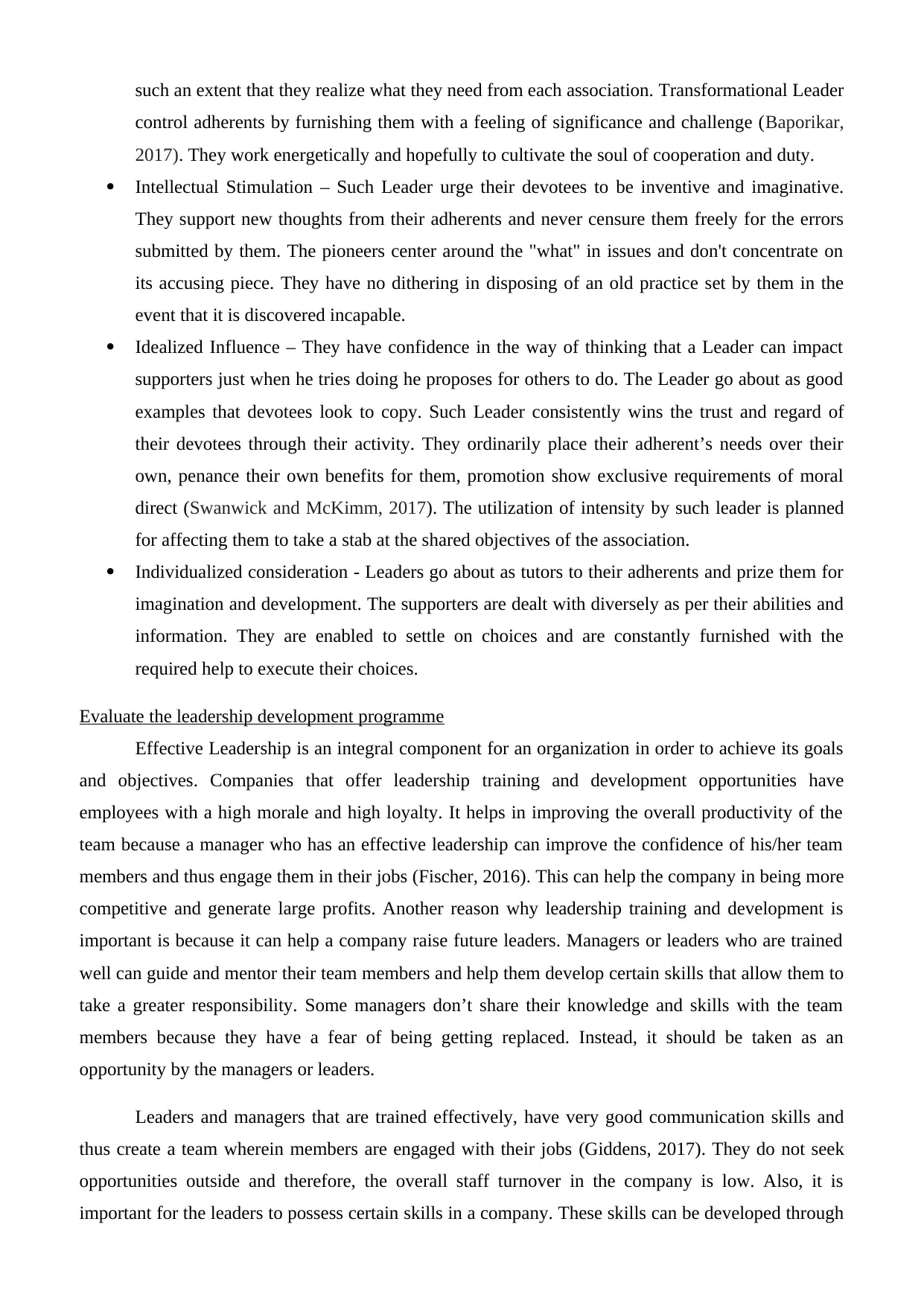
such an extent that they realize what they need from each association. Transformational Leader
control adherents by furnishing them with a feeling of significance and challenge (Baporikar,
2017). They work energetically and hopefully to cultivate the soul of cooperation and duty.
Intellectual Stimulation – Such Leader urge their devotees to be inventive and imaginative.
They support new thoughts from their adherents and never censure them freely for the errors
submitted by them. The pioneers center around the "what" in issues and don't concentrate on
its accusing piece. They have no dithering in disposing of an old practice set by them in the
event that it is discovered incapable.
Idealized Influence – They have confidence in the way of thinking that a Leader can impact
supporters just when he tries doing he proposes for others to do. The Leader go about as good
examples that devotees look to copy. Such Leader consistently wins the trust and regard of
their devotees through their activity. They ordinarily place their adherent’s needs over their
own, penance their own benefits for them, promotion show exclusive requirements of moral
direct (Swanwick and McKimm, 2017). The utilization of intensity by such leader is planned
for affecting them to take a stab at the shared objectives of the association.
Individualized consideration - Leaders go about as tutors to their adherents and prize them for
imagination and development. The supporters are dealt with diversely as per their abilities and
information. They are enabled to settle on choices and are constantly furnished with the
required help to execute their choices.
Evaluate the leadership development programme
Effective Leadership is an integral component for an organization in order to achieve its goals
and objectives. Companies that offer leadership training and development opportunities have
employees with a high morale and high loyalty. It helps in improving the overall productivity of the
team because a manager who has an effective leadership can improve the confidence of his/her team
members and thus engage them in their jobs (Fischer, 2016). This can help the company in being more
competitive and generate large profits. Another reason why leadership training and development is
important is because it can help a company raise future leaders. Managers or leaders who are trained
well can guide and mentor their team members and help them develop certain skills that allow them to
take a greater responsibility. Some managers don’t share their knowledge and skills with the team
members because they have a fear of being getting replaced. Instead, it should be taken as an
opportunity by the managers or leaders.
Leaders and managers that are trained effectively, have very good communication skills and
thus create a team wherein members are engaged with their jobs (Giddens, 2017). They do not seek
opportunities outside and therefore, the overall staff turnover in the company is low. Also, it is
important for the leaders to possess certain skills in a company. These skills can be developed through
control adherents by furnishing them with a feeling of significance and challenge (Baporikar,
2017). They work energetically and hopefully to cultivate the soul of cooperation and duty.
Intellectual Stimulation – Such Leader urge their devotees to be inventive and imaginative.
They support new thoughts from their adherents and never censure them freely for the errors
submitted by them. The pioneers center around the "what" in issues and don't concentrate on
its accusing piece. They have no dithering in disposing of an old practice set by them in the
event that it is discovered incapable.
Idealized Influence – They have confidence in the way of thinking that a Leader can impact
supporters just when he tries doing he proposes for others to do. The Leader go about as good
examples that devotees look to copy. Such Leader consistently wins the trust and regard of
their devotees through their activity. They ordinarily place their adherent’s needs over their
own, penance their own benefits for them, promotion show exclusive requirements of moral
direct (Swanwick and McKimm, 2017). The utilization of intensity by such leader is planned
for affecting them to take a stab at the shared objectives of the association.
Individualized consideration - Leaders go about as tutors to their adherents and prize them for
imagination and development. The supporters are dealt with diversely as per their abilities and
information. They are enabled to settle on choices and are constantly furnished with the
required help to execute their choices.
Evaluate the leadership development programme
Effective Leadership is an integral component for an organization in order to achieve its goals
and objectives. Companies that offer leadership training and development opportunities have
employees with a high morale and high loyalty. It helps in improving the overall productivity of the
team because a manager who has an effective leadership can improve the confidence of his/her team
members and thus engage them in their jobs (Fischer, 2016). This can help the company in being more
competitive and generate large profits. Another reason why leadership training and development is
important is because it can help a company raise future leaders. Managers or leaders who are trained
well can guide and mentor their team members and help them develop certain skills that allow them to
take a greater responsibility. Some managers don’t share their knowledge and skills with the team
members because they have a fear of being getting replaced. Instead, it should be taken as an
opportunity by the managers or leaders.
Leaders and managers that are trained effectively, have very good communication skills and
thus create a team wherein members are engaged with their jobs (Giddens, 2017). They do not seek
opportunities outside and therefore, the overall staff turnover in the company is low. Also, it is
important for the leaders to possess certain skills in a company. These skills can be developed through
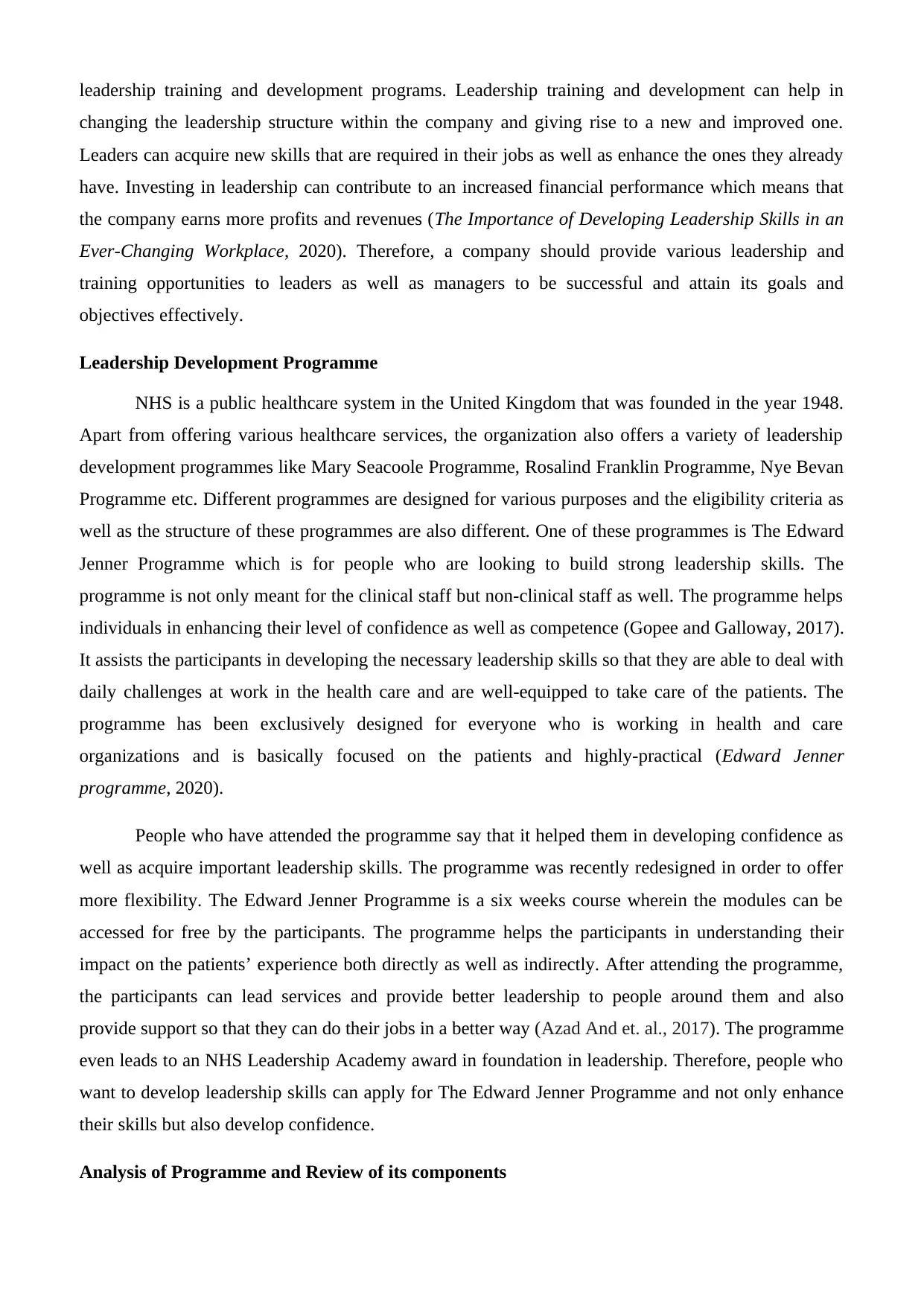
leadership training and development programs. Leadership training and development can help in
changing the leadership structure within the company and giving rise to a new and improved one.
Leaders can acquire new skills that are required in their jobs as well as enhance the ones they already
have. Investing in leadership can contribute to an increased financial performance which means that
the company earns more profits and revenues (The Importance of Developing Leadership Skills in an
Ever-Changing Workplace, 2020). Therefore, a company should provide various leadership and
training opportunities to leaders as well as managers to be successful and attain its goals and
objectives effectively.
Leadership Development Programme
NHS is a public healthcare system in the United Kingdom that was founded in the year 1948.
Apart from offering various healthcare services, the organization also offers a variety of leadership
development programmes like Mary Seacoole Programme, Rosalind Franklin Programme, Nye Bevan
Programme etc. Different programmes are designed for various purposes and the eligibility criteria as
well as the structure of these programmes are also different. One of these programmes is The Edward
Jenner Programme which is for people who are looking to build strong leadership skills. The
programme is not only meant for the clinical staff but non-clinical staff as well. The programme helps
individuals in enhancing their level of confidence as well as competence (Gopee and Galloway, 2017).
It assists the participants in developing the necessary leadership skills so that they are able to deal with
daily challenges at work in the health care and are well-equipped to take care of the patients. The
programme has been exclusively designed for everyone who is working in health and care
organizations and is basically focused on the patients and highly-practical (Edward Jenner
programme, 2020).
People who have attended the programme say that it helped them in developing confidence as
well as acquire important leadership skills. The programme was recently redesigned in order to offer
more flexibility. The Edward Jenner Programme is a six weeks course wherein the modules can be
accessed for free by the participants. The programme helps the participants in understanding their
impact on the patients’ experience both directly as well as indirectly. After attending the programme,
the participants can lead services and provide better leadership to people around them and also
provide support so that they can do their jobs in a better way (Azad And et. al., 2017). The programme
even leads to an NHS Leadership Academy award in foundation in leadership. Therefore, people who
want to develop leadership skills can apply for The Edward Jenner Programme and not only enhance
their skills but also develop confidence.
Analysis of Programme and Review of its components
changing the leadership structure within the company and giving rise to a new and improved one.
Leaders can acquire new skills that are required in their jobs as well as enhance the ones they already
have. Investing in leadership can contribute to an increased financial performance which means that
the company earns more profits and revenues (The Importance of Developing Leadership Skills in an
Ever-Changing Workplace, 2020). Therefore, a company should provide various leadership and
training opportunities to leaders as well as managers to be successful and attain its goals and
objectives effectively.
Leadership Development Programme
NHS is a public healthcare system in the United Kingdom that was founded in the year 1948.
Apart from offering various healthcare services, the organization also offers a variety of leadership
development programmes like Mary Seacoole Programme, Rosalind Franklin Programme, Nye Bevan
Programme etc. Different programmes are designed for various purposes and the eligibility criteria as
well as the structure of these programmes are also different. One of these programmes is The Edward
Jenner Programme which is for people who are looking to build strong leadership skills. The
programme is not only meant for the clinical staff but non-clinical staff as well. The programme helps
individuals in enhancing their level of confidence as well as competence (Gopee and Galloway, 2017).
It assists the participants in developing the necessary leadership skills so that they are able to deal with
daily challenges at work in the health care and are well-equipped to take care of the patients. The
programme has been exclusively designed for everyone who is working in health and care
organizations and is basically focused on the patients and highly-practical (Edward Jenner
programme, 2020).
People who have attended the programme say that it helped them in developing confidence as
well as acquire important leadership skills. The programme was recently redesigned in order to offer
more flexibility. The Edward Jenner Programme is a six weeks course wherein the modules can be
accessed for free by the participants. The programme helps the participants in understanding their
impact on the patients’ experience both directly as well as indirectly. After attending the programme,
the participants can lead services and provide better leadership to people around them and also
provide support so that they can do their jobs in a better way (Azad And et. al., 2017). The programme
even leads to an NHS Leadership Academy award in foundation in leadership. Therefore, people who
want to develop leadership skills can apply for The Edward Jenner Programme and not only enhance
their skills but also develop confidence.
Analysis of Programme and Review of its components
⊘ This is a preview!⊘
Do you want full access?
Subscribe today to unlock all pages.

Trusted by 1+ million students worldwide
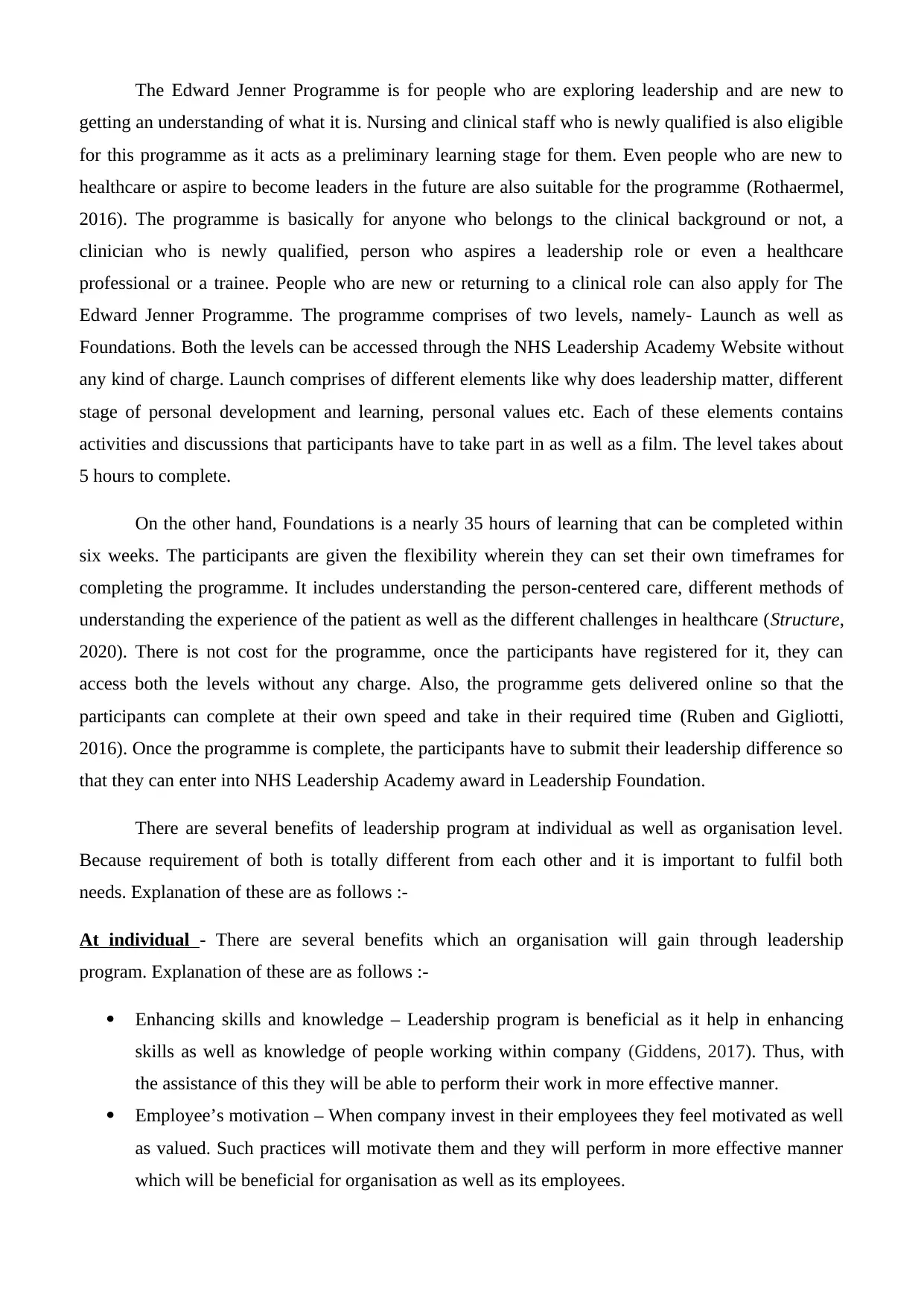
The Edward Jenner Programme is for people who are exploring leadership and are new to
getting an understanding of what it is. Nursing and clinical staff who is newly qualified is also eligible
for this programme as it acts as a preliminary learning stage for them. Even people who are new to
healthcare or aspire to become leaders in the future are also suitable for the programme (Rothaermel,
2016). The programme is basically for anyone who belongs to the clinical background or not, a
clinician who is newly qualified, person who aspires a leadership role or even a healthcare
professional or a trainee. People who are new or returning to a clinical role can also apply for The
Edward Jenner Programme. The programme comprises of two levels, namely- Launch as well as
Foundations. Both the levels can be accessed through the NHS Leadership Academy Website without
any kind of charge. Launch comprises of different elements like why does leadership matter, different
stage of personal development and learning, personal values etc. Each of these elements contains
activities and discussions that participants have to take part in as well as a film. The level takes about
5 hours to complete.
On the other hand, Foundations is a nearly 35 hours of learning that can be completed within
six weeks. The participants are given the flexibility wherein they can set their own timeframes for
completing the programme. It includes understanding the person-centered care, different methods of
understanding the experience of the patient as well as the different challenges in healthcare (Structure,
2020). There is not cost for the programme, once the participants have registered for it, they can
access both the levels without any charge. Also, the programme gets delivered online so that the
participants can complete at their own speed and take in their required time (Ruben and Gigliotti,
2016). Once the programme is complete, the participants have to submit their leadership difference so
that they can enter into NHS Leadership Academy award in Leadership Foundation.
There are several benefits of leadership program at individual as well as organisation level.
Because requirement of both is totally different from each other and it is important to fulfil both
needs. Explanation of these are as follows :-
At individual - There are several benefits which an organisation will gain through leadership
program. Explanation of these are as follows :-
Enhancing skills and knowledge – Leadership program is beneficial as it help in enhancing
skills as well as knowledge of people working within company (Giddens, 2017). Thus, with
the assistance of this they will be able to perform their work in more effective manner.
Employee’s motivation – When company invest in their employees they feel motivated as well
as valued. Such practices will motivate them and they will perform in more effective manner
which will be beneficial for organisation as well as its employees.
getting an understanding of what it is. Nursing and clinical staff who is newly qualified is also eligible
for this programme as it acts as a preliminary learning stage for them. Even people who are new to
healthcare or aspire to become leaders in the future are also suitable for the programme (Rothaermel,
2016). The programme is basically for anyone who belongs to the clinical background or not, a
clinician who is newly qualified, person who aspires a leadership role or even a healthcare
professional or a trainee. People who are new or returning to a clinical role can also apply for The
Edward Jenner Programme. The programme comprises of two levels, namely- Launch as well as
Foundations. Both the levels can be accessed through the NHS Leadership Academy Website without
any kind of charge. Launch comprises of different elements like why does leadership matter, different
stage of personal development and learning, personal values etc. Each of these elements contains
activities and discussions that participants have to take part in as well as a film. The level takes about
5 hours to complete.
On the other hand, Foundations is a nearly 35 hours of learning that can be completed within
six weeks. The participants are given the flexibility wherein they can set their own timeframes for
completing the programme. It includes understanding the person-centered care, different methods of
understanding the experience of the patient as well as the different challenges in healthcare (Structure,
2020). There is not cost for the programme, once the participants have registered for it, they can
access both the levels without any charge. Also, the programme gets delivered online so that the
participants can complete at their own speed and take in their required time (Ruben and Gigliotti,
2016). Once the programme is complete, the participants have to submit their leadership difference so
that they can enter into NHS Leadership Academy award in Leadership Foundation.
There are several benefits of leadership program at individual as well as organisation level.
Because requirement of both is totally different from each other and it is important to fulfil both
needs. Explanation of these are as follows :-
At individual - There are several benefits which an organisation will gain through leadership
program. Explanation of these are as follows :-
Enhancing skills and knowledge – Leadership program is beneficial as it help in enhancing
skills as well as knowledge of people working within company (Giddens, 2017). Thus, with
the assistance of this they will be able to perform their work in more effective manner.
Employee’s motivation – When company invest in their employees they feel motivated as well
as valued. Such practices will motivate them and they will perform in more effective manner
which will be beneficial for organisation as well as its employees.
Paraphrase This Document
Need a fresh take? Get an instant paraphrase of this document with our AI Paraphraser
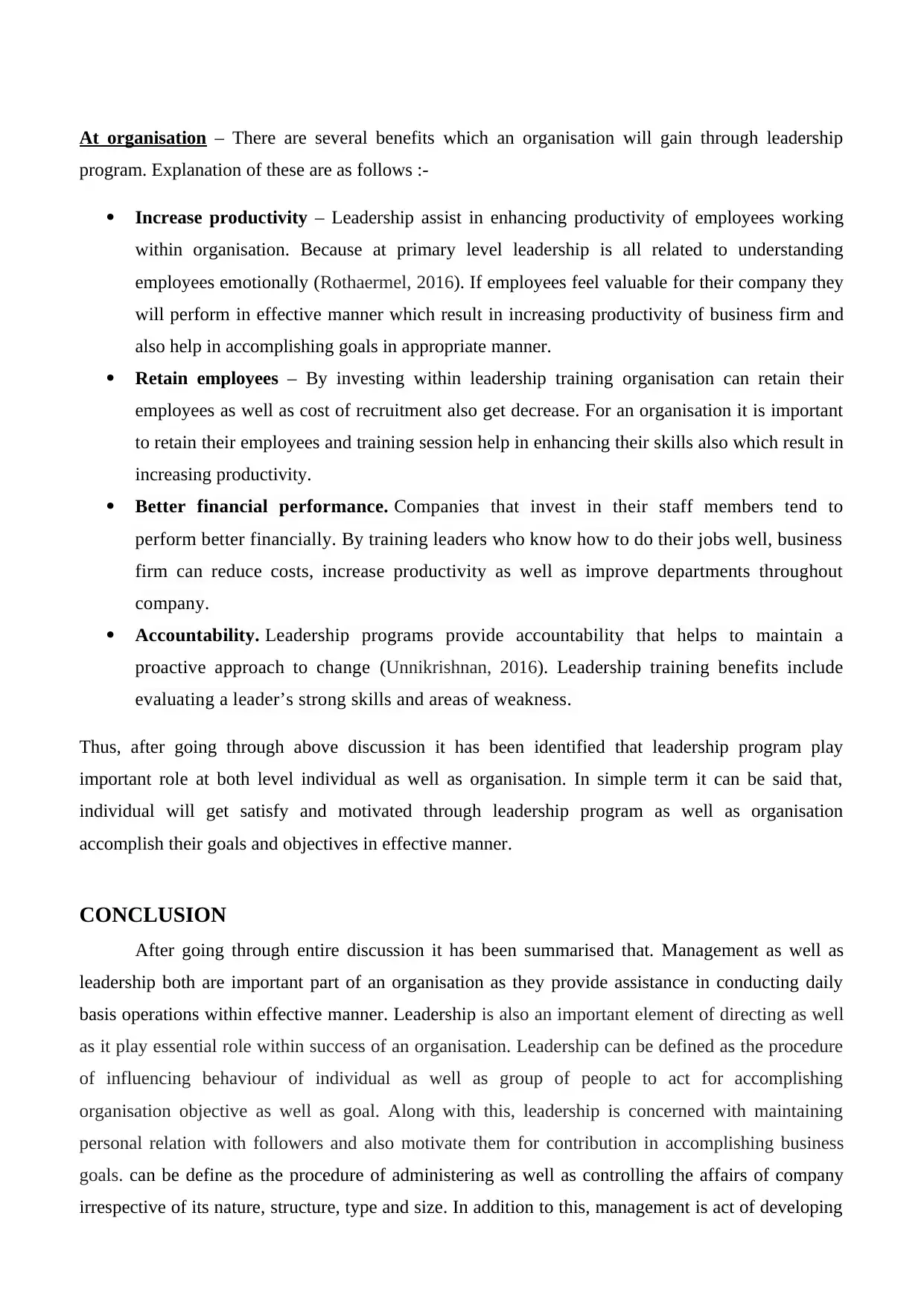
At organisation – There are several benefits which an organisation will gain through leadership
program. Explanation of these are as follows :-
Increase productivity – Leadership assist in enhancing productivity of employees working
within organisation. Because at primary level leadership is all related to understanding
employees emotionally (Rothaermel, 2016). If employees feel valuable for their company they
will perform in effective manner which result in increasing productivity of business firm and
also help in accomplishing goals in appropriate manner.
Retain employees – By investing within leadership training organisation can retain their
employees as well as cost of recruitment also get decrease. For an organisation it is important
to retain their employees and training session help in enhancing their skills also which result in
increasing productivity.
Better financial performance. Companies that invest in their staff members tend to
perform better financially. By training leaders who know how to do their jobs well, business
firm can reduce costs, increase productivity as well as improve departments throughout
company.
Accountability. Leadership programs provide accountability that helps to maintain a
proactive approach to change (Unnikrishnan, 2016). Leadership training benefits include
evaluating a leader’s strong skills and areas of weakness.
Thus, after going through above discussion it has been identified that leadership program play
important role at both level individual as well as organisation. In simple term it can be said that,
individual will get satisfy and motivated through leadership program as well as organisation
accomplish their goals and objectives in effective manner.
CONCLUSION
After going through entire discussion it has been summarised that. Management as well as
leadership both are important part of an organisation as they provide assistance in conducting daily
basis operations within effective manner. Leadership is also an important element of directing as well
as it play essential role within success of an organisation. Leadership can be defined as the procedure
of influencing behaviour of individual as well as group of people to act for accomplishing
organisation objective as well as goal. Along with this, leadership is concerned with maintaining
personal relation with followers and also motivate them for contribution in accomplishing business
goals. can be define as the procedure of administering as well as controlling the affairs of company
irrespective of its nature, structure, type and size. In addition to this, management is act of developing
program. Explanation of these are as follows :-
Increase productivity – Leadership assist in enhancing productivity of employees working
within organisation. Because at primary level leadership is all related to understanding
employees emotionally (Rothaermel, 2016). If employees feel valuable for their company they
will perform in effective manner which result in increasing productivity of business firm and
also help in accomplishing goals in appropriate manner.
Retain employees – By investing within leadership training organisation can retain their
employees as well as cost of recruitment also get decrease. For an organisation it is important
to retain their employees and training session help in enhancing their skills also which result in
increasing productivity.
Better financial performance. Companies that invest in their staff members tend to
perform better financially. By training leaders who know how to do their jobs well, business
firm can reduce costs, increase productivity as well as improve departments throughout
company.
Accountability. Leadership programs provide accountability that helps to maintain a
proactive approach to change (Unnikrishnan, 2016). Leadership training benefits include
evaluating a leader’s strong skills and areas of weakness.
Thus, after going through above discussion it has been identified that leadership program play
important role at both level individual as well as organisation. In simple term it can be said that,
individual will get satisfy and motivated through leadership program as well as organisation
accomplish their goals and objectives in effective manner.
CONCLUSION
After going through entire discussion it has been summarised that. Management as well as
leadership both are important part of an organisation as they provide assistance in conducting daily
basis operations within effective manner. Leadership is also an important element of directing as well
as it play essential role within success of an organisation. Leadership can be defined as the procedure
of influencing behaviour of individual as well as group of people to act for accomplishing
organisation objective as well as goal. Along with this, leadership is concerned with maintaining
personal relation with followers and also motivate them for contribution in accomplishing business
goals. can be define as the procedure of administering as well as controlling the affairs of company
irrespective of its nature, structure, type and size. In addition to this, management is act of developing
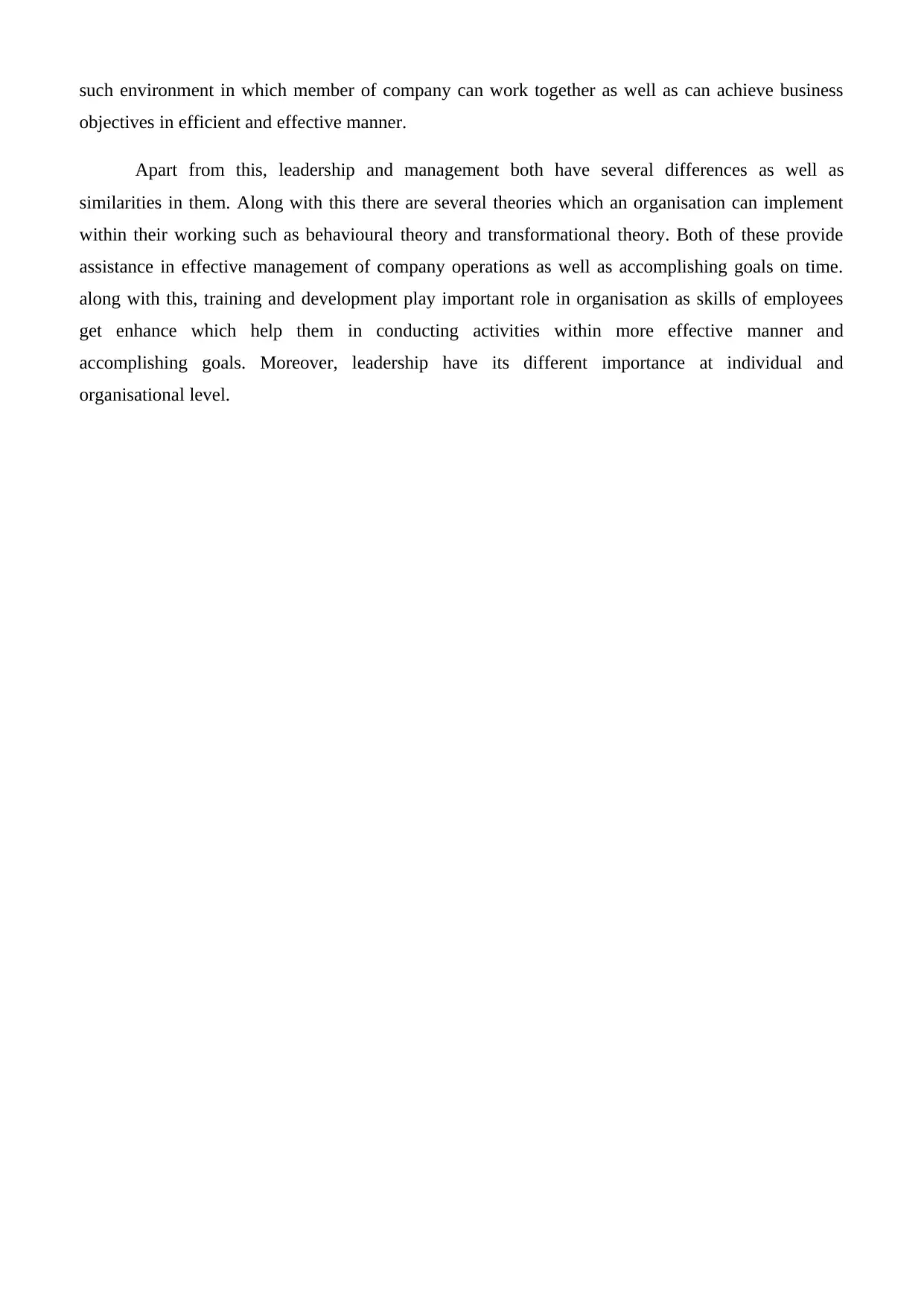
such environment in which member of company can work together as well as can achieve business
objectives in efficient and effective manner.
Apart from this, leadership and management both have several differences as well as
similarities in them. Along with this there are several theories which an organisation can implement
within their working such as behavioural theory and transformational theory. Both of these provide
assistance in effective management of company operations as well as accomplishing goals on time.
along with this, training and development play important role in organisation as skills of employees
get enhance which help them in conducting activities within more effective manner and
accomplishing goals. Moreover, leadership have its different importance at individual and
organisational level.
objectives in efficient and effective manner.
Apart from this, leadership and management both have several differences as well as
similarities in them. Along with this there are several theories which an organisation can implement
within their working such as behavioural theory and transformational theory. Both of these provide
assistance in effective management of company operations as well as accomplishing goals on time.
along with this, training and development play important role in organisation as skills of employees
get enhance which help them in conducting activities within more effective manner and
accomplishing goals. Moreover, leadership have its different importance at individual and
organisational level.
⊘ This is a preview!⊘
Do you want full access?
Subscribe today to unlock all pages.

Trusted by 1+ million students worldwide
1 out of 14
Related Documents
Your All-in-One AI-Powered Toolkit for Academic Success.
+13062052269
info@desklib.com
Available 24*7 on WhatsApp / Email
![[object Object]](/_next/static/media/star-bottom.7253800d.svg)
Unlock your academic potential
Copyright © 2020–2026 A2Z Services. All Rights Reserved. Developed and managed by ZUCOL.




